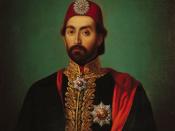Was the Tanzimat a serious attempt at reform? Was it effective? The reforms of the Tanzimat era were seen as necessary in keeping the Ottoman Empire intact in light of new nationalist movements seen in the empire and elsewhere. Sultan Mahmud II was western educated, and he saw similar reforms and occur in Europe as well as the rise of nationalism. Reform was needed to keep control the people.
Mahmud II introduced the first reforms in 1839 which mainly aimed to uproot the injustices and oppression that the millet system had induced. It promised equal rights for all males and largely attempted to westernize the country by establishing universal conscription, equal tax reform, rail roads, factories, and a new civic and criminal justice system. The reforms also brought Christians, whom were under less control, back under Ottoman rule. All of this required a major restructuring of society that displeased some groups.
Christians in the Balkans were upset with the new centralized government which hindered their goal of autonomy. Other Europeans demanded sovereignty. While the Ottomans attempted to retain their borders, Russia sought to expand their lands. These opposing policies led to the Crimean War, and without the aid from the British and French the Ottomans might have lost much of their territory. With the end of the war in 1856 came a new wave of reforms. Equality was now promised to all Muslim and non-Muslim subjects in the empire. This stirred rebellion and discontent within both Muslim and Christian peoples. The Muslims who once held social and legal superiority were angered at their loss of elite status, territorial autonomy, and tradition. The new reform also brought a secularized justice system that many Muslims viewed as contradictory to sharia. This brought about groups such as the Young Turks who would resist...


